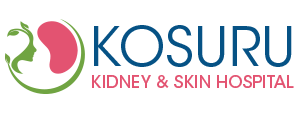Chemical peel is a technique to enhance the skin texture and tone of your face, neck and hands. A chemical solution can be applied on the skin that leads to exfoliate and gradually peel off. The newly regenerated skin is with no wrinkles and very smooth than the old skin. The new skin is tentatively more delicate to the sun rays.
Kidney Diseases in Children

How does kidney disease affect children?
Children can be impacted by Kidney ailment in numerous methods, ranging from treatable issues without long term results to lifestyles-threatening conditions. Acute kidney diseases advances all of sudden, lasts a short time, and may be extreme with long lasting consequences or may work away absolutely as soon as the underlying issue has been treated at Best Hospitals for children Kidney diseases in Narasaraopet.
Chronic kidney disease (CKD) is inclined to get worse over time and wont get cured. Kidney failure is the end result of CKD, described as end-stage kidney disease or ESRD when dealt treated with a kidney transplant or blood-filtering remedies referred to as dialysis.
What are the Causes of kidney diseases in Children?
Kidney disease occur in children often for various reasons than adults do.
Causes of kidney disease in children include:
- Birth defects
- Genetic diseases
- Infection
- Nephrotic syndrome
- Systemic diseases
- Trauma
- Urine blockage and reflux
What are the most Common Childhood Kidney Diseases?
The most common kidney diseases in children are present at birth. They include:
- Posterior urethral valve obstruction: This narrowing or obstruction of the urethra affects only boys. It can be diagnosed before the baby is born or just after and is treated with surgery.
- Fetal hydronephrosis: Any obstruction in the development of urinary tract can lead to enlargement of one or both the kidneys known as vesicoureteral reflux (VUR) where the urine flows abnormally refluxes from the bladder into the ureters. Fetal hydronephrosis is commonly diagnosed prior to the child is born and remedy varies widely. In some cases, the condition only needs continuous monitoring; in others, surgical treatment for Children kidney disease in Narasaraopet have to be performed to clear the obstruction from the urinary tract.
- Polycystic kidney disease (PKD): This is a condition in which many fluid-filled cysts develop in both kidneys. The cysts can multiply so much and grow so large that they lead to kidney failure. Most forms of PKD are inherited. Doctors can diagnose it before or after the child is born. In some cases, there are no symptoms; in others, PKD can lead to UTIs, kidney stones, and high blood pressure. Treatment for PKD varies — some cases can be managed with dietary changes; others require a kidney transplant or dialysis.
- Multicystic kidney disease (MKD): This disease occurs while the large cysts advance in a kidney that has not yet developed and gradually causes the kidney to stop working .(While PKD constantly influences each kidneys, MKD usually impacts just one kidney.) Fortunately, the unaffected kidney takes over and most people with MKD may have normal functioning of kidney. Before birth MKD is diagnosed usually by means of prenatal ultrasound. It is managed by best pediatric nephrologists in narasaraopet through means of monitoring blood stress and screening for UTIs while required. In very rare cases, surgical removal of the kidney is probably vital.
Stages of kidney disease
Kidney disease in children is diagnosed the same way it is in adults. A urine test, blood test, imaging test, or kidney biopsy can help determine if something is wrong with the kidneys. And the Common Stages of kidney disease in children and adults ages 2+
- Stage 1: Kidney damage with normal or increased GFR
- Stage 2: Kidney damage with mild decrease GFR
- Stage 3a: Mild to moderate decrease GFR
- Stage 3b: Moderate to severe decrease GFR
- Stage 4: Severe decrease GFR
- Stage 5: Kidney failure

